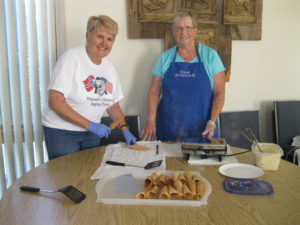Sermon for Sunday, August 6, 2017 – “Feeding and Seeing”
Ninth Sunday after Pentecost
August 6, 2017
Good Shepherd Lutheran Church
Decorah, Iowa
Rev. Amy Zalk Larson
Click here to read scripture passages for the day.
Beloved of God, grace to you and peace in the name of Jesus. Amen.
There’s a whole lot of food and feeding going on in this story. But I think there’s something else happening here, too.
In addition to feeding a huge crowd, Jesus helps others and all of us to see the world in a new way. Through- out this story, Jesus’ perspective is in sharp contrast with those around him. His perspective changes everything – for the people then, and for us today.
The disciples see the situation as an overwhelming problem that they don’t want to touch. They look at the huge crowd and see just a bunch of hungry, needy people. They look at the desolate surroundings, the darkness closing in, and they start to panic. They say to Jesus, “Send the crowds away so they may go buy food for themselves.” They want Jesus to get rid of the problem and have the people fend for themselves.
Instead, Jesus says, “They need not go away, you give them something to eat.” The disciples protest, “We have nothing, [just] five loaves and two fish.” The disciples focus on what they lack, on how limited their resources appear in the face of so much need.
This is all understandable, especially given the other realities the disciples see on the horizon. They’ve got bigger problems. They can’t be focused on the needs of this crowd. They need to conserve their resources to face the threat posed by King Herod.
King Herod has just beheaded John the Baptist, Jesus’ friend and relative – the one sent to prepare the way for Jesus. John’s message to “repent, for the kingdom of heaven has come near” is a direct challenge to people like Herod, people working for the oppressive Roman empire rather than for God’s kingdom. Herod and his wife see John as a threat to their power, a threat that needs to be eliminated. Herod’s wife demands John’s head on a platter and Herod gives it to her.
This is probably pretty eye-opening for Jesus’ disciples. Up until this point they may not have realized how directly the message of John and Jesus is a challenge to the powers that be. Now, following Jesus looks to be a lot more dangerous.
The disciples probably feel they need time with Jesus to figure out what this all means for the movement and how to respond to Herod. Instead, Jesus is healing the sick and telling them to feed a huge crowd.
Jesus is likely grieving too. When he hears the news that John has been beheaded he tries to retreat to a quiet place, probably to grieve and to pray. Yet the crowds follow him. When Jesus sees the crowds, we’re told, he has compassion for them and cures the sick among them. His grief doesn’t shut him off from the crowd; instead he seeks to alleviate others’ pain.
Jesus doesn’t see a problem to be fixed like the disciples do. He certainly doesn’t try to eliminate the problem the way Herod does. Jesus sees the people and has compassion on them.
Jesus views the people as God views them – as beloved of God. If they are sick, they should be healed. If they are hungry, they should be fed.
Jesus also sees possibility where the disciples only see scarcity. When he learns that the disciples have just five loaves and two fish, he doesn’t get concerned. He asks them to bring what little they have. He prays, blesses the bread, and gives it back to the disciples for them to feed the crowds.
Jesus looks at the crowd with compassion. He sees possibilities rather than scarcity. That perspective changes everything for the disciples and the crowd.
It also changes everything for us today. We know that we so often approach things the way the disciples did. We get overwhelmed by the many hurting, hungry people in our world today. We wonder if we have enough to give in the face of all the need. We worry about the political climate. We want quick fixes to challenges. We want problems to go away without taxing us too much. At times, we’re even tempted to forcefully remove people and problems just so we don’t have to deal with them anymore.
The good news is that Jesus also sees us with compassion and a sense of possibility. Jesus does not worry about all the shortcomings within us. He looks at us and sees, yes, our sinfulness but also that we have been created good. He sees the gifts God has given us to feed and care for others.
Jesus doesn’t give up on us. He continues to challenge us through his word saying, “There is no need for them to go away. You give them something to eat.” He calls us to give what we have and to trust God to work through us and our offerings, however insufficient they may feel.
Jesus also feeds and forgives us. When we are fed and forgiven at Christ’s table, we are set free. We are set free from a fixation on ourselves and all that we lack. Our vision is expanded to see others with compassion and to see the ways that we can make a difference. Our perspective is changed.
Jesus sees the possibility within each of us and works to bring it forth in us by feeding us, challenging us, and forgiving us. We have all that we need to view the world differently and offer ourselves to feed others.
Let’s take a moment for silent prayer.




